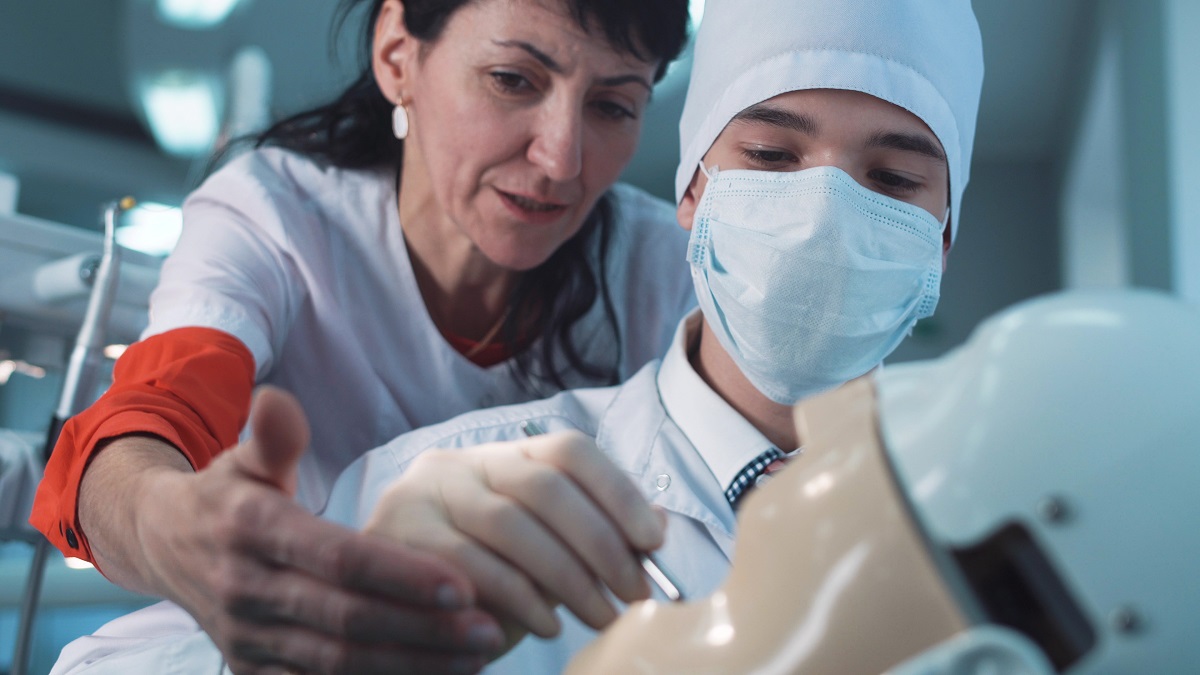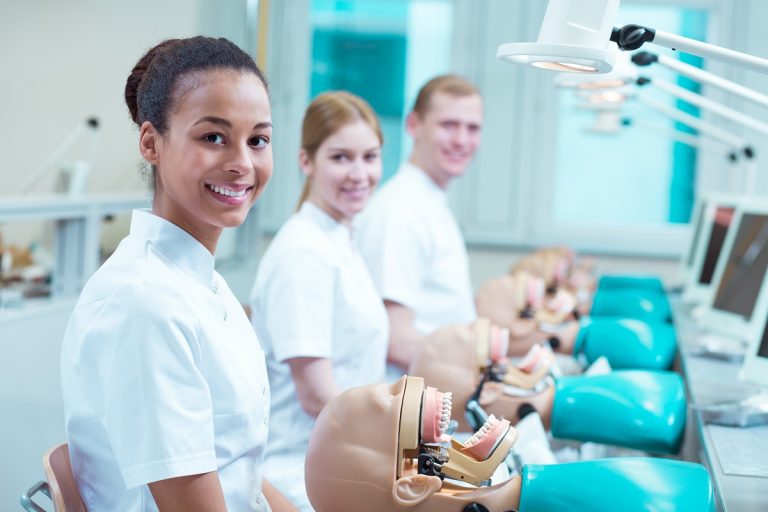Is Dental School Harder Than Medical School?
Choosing which path to go and which profession to follow is one of the hardest questions every student has to answer; especially when it all boils down to either medical or dental school. Both educations are known for their exhaustive lectures, practices, and commitment to studying and learning. But, which one is better for you? And, after all, which school is harder, medical or dental?
If you’re having doubts about which school to apply to, you’re at the right place. In the following paragraphs, we’ll compare dental and medical schools and the things that make them difficult not only to get admitted in but to go through as well. So, without further ado, let’s get started!
Dental Vs. Medical School: Which Is Harder?

1. Admission – Which School Is Harder To Be Admitted To?
So, in the sense of admission difficulty, one has to observe the amount of medical and dental schools in the country, look at the number of available seats, and divide all of that with the number of applicants and those who were admitted.
It is important to emphasize that there are many more medical schools in the US than dental schools, so there are many more applicants to medical schools as well. So, one would presume that it is harder to get admission into medical school, and one would be right.
Because there are so many medical schools, the admission system is also a lot more competitive than the dental school admission system. For example, the average MD matriculant has an average undergraduate GPA of 3.7 and an MCAT of 511; this is an 82nd percentile score.
The DO matriculants have an average GPA of 3.5, and an average MCAT of 503; this is a 61st percentile score. On the other hand, the average dental school matriculant has a GPA of 3.5, and a DAT score up to 20; this is a 75th percentile score.
Truth to be told, dental schools are becoming more competitive themselves, so there is no telling whether at some point it would be harder to get admitted into a dental school than medical school.
2. Education Program Characteristics
For a more thorough analysis of which school is harder, it is important to take a look at the very educational programs of both dental and medical schools.
Dental School
- Duration – 4 years
- Curriculum flexibility – almost completely lock-step
- The focus of the programs – emphasis on the dentition
- The outcome of the programs – student ability to function as unsupervised, entry-level general practitioner upon graduation
- Curriculum structure – multi-disciplinary basic science, department-based courses, and limited cross-disciplinary learning in pre-clinical or clinical curricula
- Nature of courses – 60 to 80 different courses, lecture courses in clinical years, no clerkship-type rotation in 3rd year, skill improvement in several areas simultaneously, etc.
- Biomedical sciences – approximately between 800 and 1000 clock hours
- Clinical education – completion of in-mouth procedural requirements (technique repetitions); extensive hands-on learning; patients assigned to students, etc.
- Location of clinical education – on-campus clinic
Medical School
- Duration – 4 years (followed by residency and fellowship, so combined the duration extends to 10 years)
- Curriculum flexibility – primary lock-step until 3rd year
- The focus of the programs – general review of human structure, anatomy, function, and pathophysiology
- The outcome of the programs – student ability to enter a residency program; expose students to medical specialties and develop patient-care skills
- Curriculum structure – multidisciplinary courses and specialty-based courses, multidisciplinary primary care rotations
- Nature of courses – first 2 years, there are 15 to 20 total courses; the 3rd year comprises 6 to 8 multi-week rotations, and the 4th year comprises several multi-week rotations and substantial elective; during the 3rd and 4th year there are few courses
- Biomedical sciences – approximately between 1,500 and 1,800 clock hours
- Clinical education – team-ladder model (students the lowest on the ladder); observation from residents and attendings; students exposed to a wide spectrum of diseases, diagnosis practice, and case presentations
- Location of clinical education – patient care facilities, rotations in community clinics and practitioner’s offices
As we can see, both dental and medical school are hard, but in different ways. Both have the same curriculum for the first 2 years, as well as pre-clinical labs. During the 3rd and 4th year, students focus more on patient care and advanced clinical courses.
Some believe that dental school is more challenging since there is no residency program where the student can build-up knowledge and practice. In dental school, everything is packed in those 4 years.
Comparatively, in medical schools, the students need to work hard nevertheless, but it might be easier for them to go through the program since it is designed to require further education, as in a residency program or internships.
If we look at the very duration of these educational programs, medical school is definitely harder, since the educational journey can last approximately 10 years. It can take a doctor up to 10 years to stand as truly independent and licensed, while dentist students can take up to 6 years to be independent, and they do not need to go through an internship.
Nevertheless, both dental and medical schools require intelligence, dedication, a hands-on approach, active listening and knowledge implementation on the spot, altruism, sincerity, and much more.
Regardless of whether you’re attending a dental or medical school, you need to have the perfect combination of empathy, understanding, and psycho-motor skills. You also need to be a team player and not a show-off. Doctors are only appreciated fully when they truly care about their patients, and not only about how much they know.
3. A Detailed Comparison
If you need more information, here’s a quick and detailed comparison of both schools, showing why both dental and medical school are equally hard;
- Both dental and medical schools have the same curriculum for the first 2 years.
- As the courses progress, students of dentistry need to focus on oral medicine, while students of medicine focus on human physiology, anatomy, and patient care.
- Both schools have the same levels of difficulty when it comes to courses and disciplines.
- The dental school offers practical courses much earlier into the schooling.
- Medical school offers only classroom learning during the first 2 years.
- Dentists are expected to learn the hands-on approach much earlier into the schooling, so it can be difficult to manage classroom learning and practical learning.
- Medical students also need to go through practical learning, but it gets more intense during the residency training.
- Medical students usually have lengthy subjects since they have to cover the anatomy of the whole human body, while the dentists only focus on one area.
- Medical school can be considered harder since students have to learn everything about human bodies, but it can be equally difficult to study exhaustively only one area, which most of dental school students complain about.

4. So, Which School Is Harder?
To say exactly which school is more difficult, the dental or the medical school, one would have to attend and experience both. It would need someone who has attended both schools to weigh in, but what we can say in general is that both schools are difficult in distinct and different ways.
You can expect to have the same curriculum for the first 2 years in both dental and medical school. The 3rd and 4th years students usually spend more on practical learning, seeing patients, and taking more advanced courses, which are often only a few.
One thing that does differ significantly between dental and medical school is that the 4th year in dental school is more challenging. For example, in medical school, the 4th year is just a bridge between medical school and residency training. In dental school, there is no residency to follow, so the 4th year can be pretty intense in practical learning and experience gaining.
5. Can You Change Schools?
Changing a career path can be difficult, but it most certainly is doable and possible. Sure, it can be very stressful to go from dental school to medical school, and vice versa. You’re probably affecting your family’s expectations, and you may even feel uncertain about whether this decision is right for you.
But, with some hard work and determination, you can easily change schools. If you feel like medical school is too hard for you, and the dental school seems appealing, then feel free to apply to a dental school. The transition should be smooth and easy, especially if you do it in the first two years while the curriculum is almost the same.
However, if you’re already in the residency program, and for some reason, you want to change your career and go for dentistry, things may get a little tricky. Since you’re already so far into medicine, we recommend you think about this decision thoroughly. If you still feel like you’re having a change of heart, then all you can do is contact dental schools and see what the procedure might be.
Some dental schools might allow you to skip the first 2 years of curriculum, since you already have extensive knowledge, and go straight to the 3rd year. This is when the practical part of dentistry begins, so maybe you can get in on time.
The Final Verdict
If you’re not a fan of hectic lectures, clinical schedules, and work with patients, then both dental and medical schools will be hard and difficult for you. However, if you truly want to become a dentist or a doctor, then things are probably already clear in your head. Going through medical or dental school is just an obstacle to overcome in order to help people and take care of their health.
Sure, long hours and studying will become a major part of your life, for years. But, we believe it is all worth it once you realize your accomplishments and the fact that you’re licensed to help and save lives. We would say that one school is not harder than the other if you’re truly committed and dedicated.







